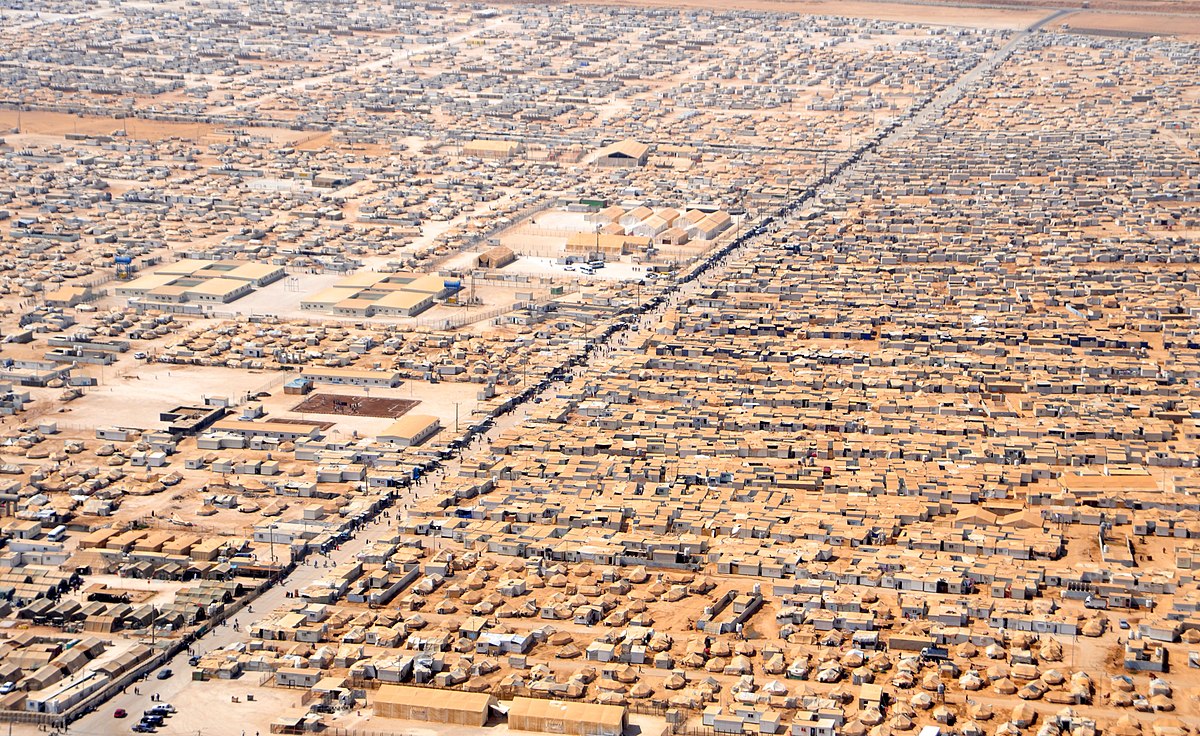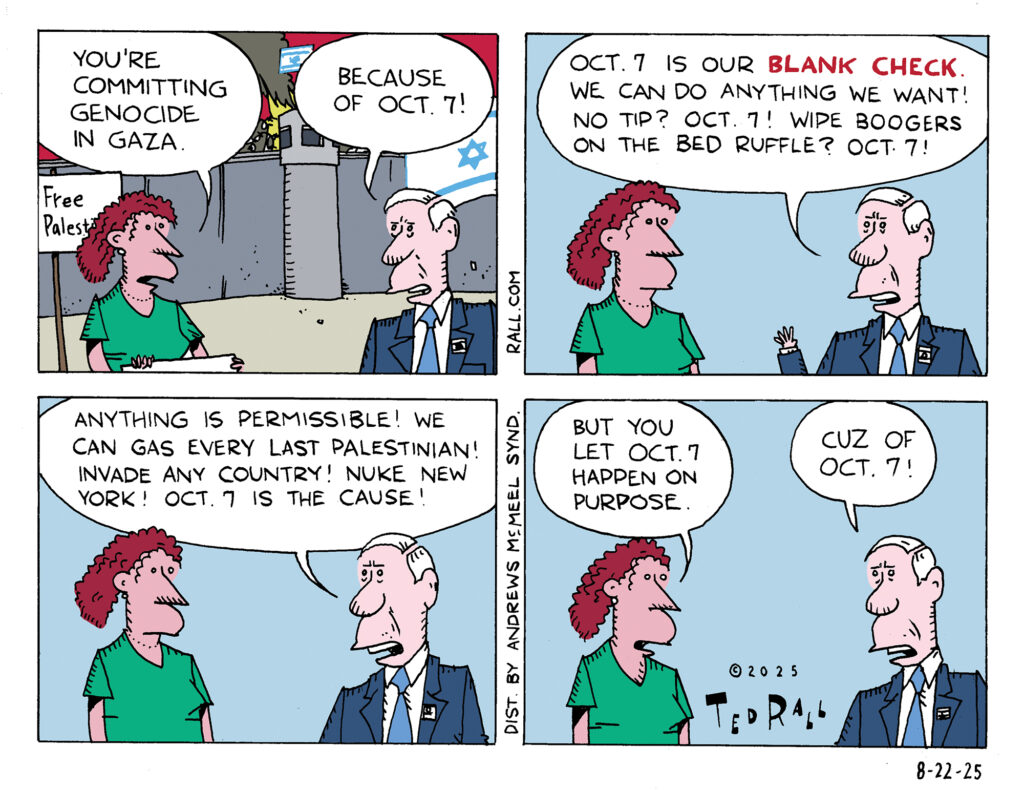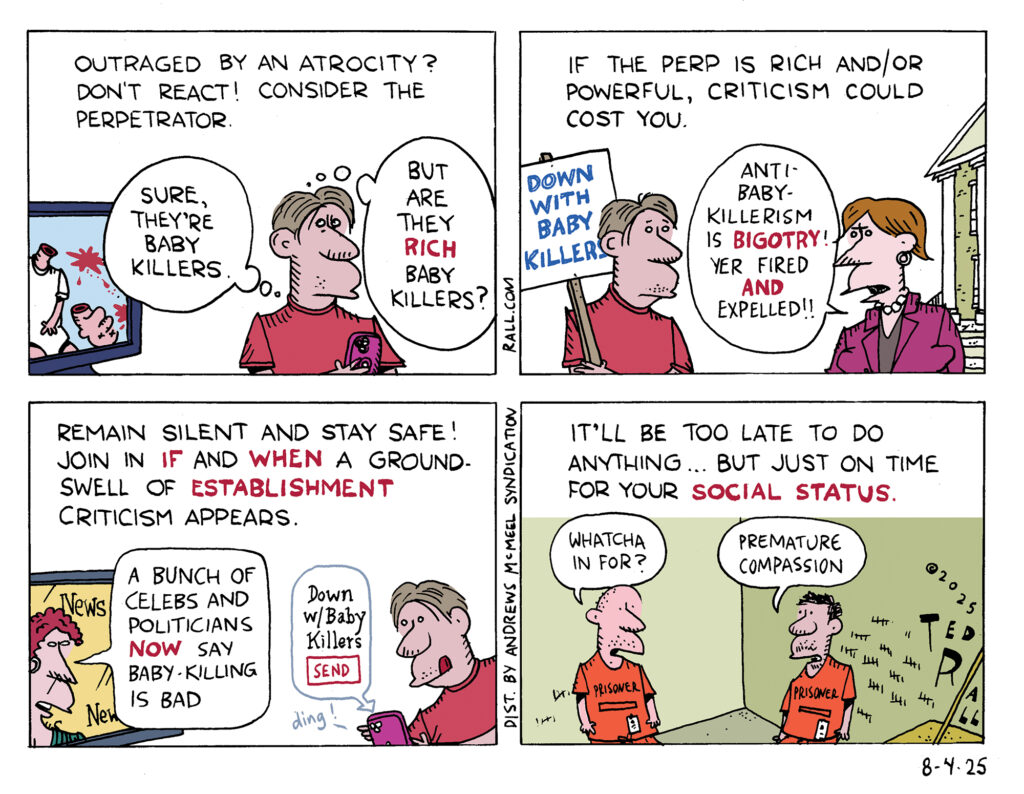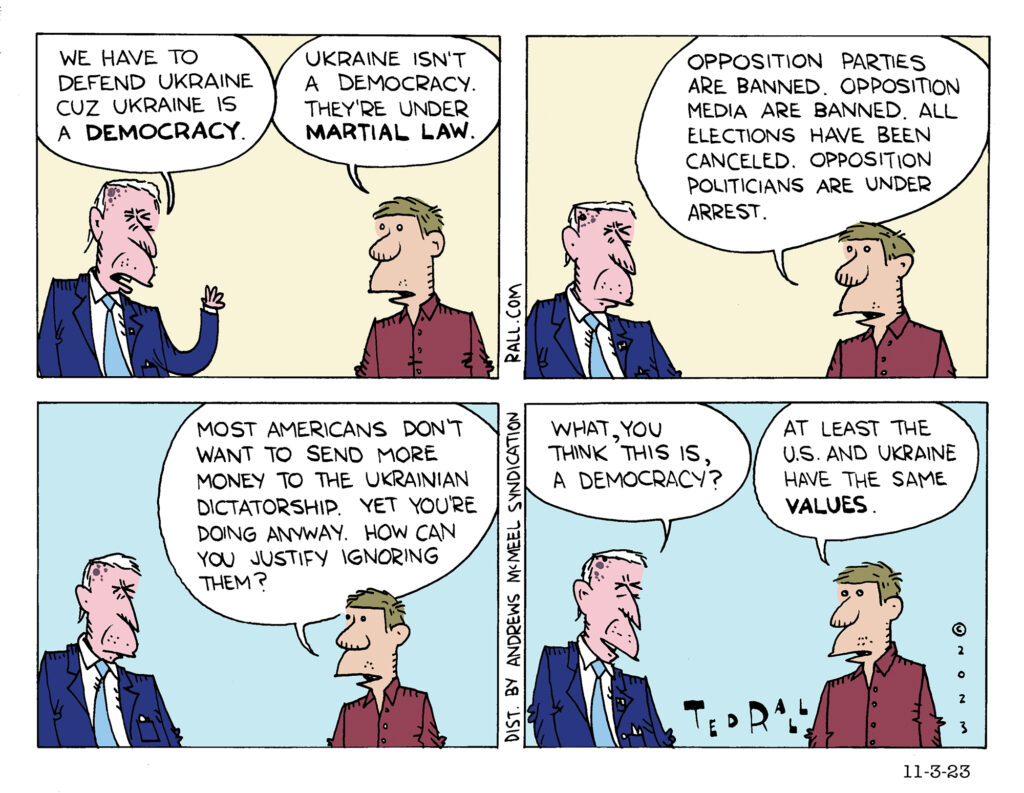It’s ringing increasingly hollow, but Zionist supporters of Israel keep saying that everything they do, no matter how extreme, illegal, and cruel, is justified because of the losses the Jewish state suffered on October 7, 2023.
Avoid Premature Compassion
After more than a year of Israel’s relentless genocide of Palestinians in Gaza, establishment and mainstream people and institutions finally feel it is safe to criticize the Jewish state. This is the latest instance of a dispiriting aspect of social behavior. Most people can identify wrongdoing when they see it, but they will not call it out until it feels safe to do so. This is especially true when the perpetrator is rich or powerful. However, that can take a long time—so long that it is often too late for the victims.
Give It Up, Israel
TMI Show Ep 68: Trump To Send Migrants to Notorious Torture Camp
Airing LIVE at 10 am Eastern time this morning, then Streaming 24-7 thereafter:
Guantánamo Bay concentration camp, the American human-rights disaster made infamous by the Bush Administration when it sent Muslim detainees to be tortured there out of reach from the law, is about to radically expand. Donald Trump has ordered the camp to prepare for the arrival of 30,000 migrants, many of whom have never been charged with a crime.
On “The TMI Show,” co-hosts Manila Chan and Ted Rall discuss the morality, practicality and political implications of Trump’s latest move in his war against illegal immigrants.
Israel Has Crossed Its Rubicon

A few weeks ago, from an international and domestic-U.S. PR standpoint, Israel might have been able to bring its war in Gaza in for a hard landing. Now it has painted itself into a corner.
Gaza has been destroyed. By this time next year, so will Israel—not its physical plant, but its current status as a privileged, funded, protected nation-state.
The damage inflicted thus far is so severe and thorough that the Gaza Strip will be uninhabitable for the foreseeable future, at least several years. All or most of its 2.3 million residents, transformed into refugees, will be permanently displaced.
Nothing can change that. If a left-wing Israeli government were to come to power, unilaterally end the war and offer the Palestinians their own sovereign independent republic side-by-side with Israel, Gaza would need to be rebuilt at a cost of tens if not hundreds of billions of dollars. In the meantime, the Jewish state would have to provide long-term housing and public assistance for more than 2 million Palestinians throughout years of reconstruction. “You’ll end up having displaced people living in tents for a long time,” Raphael Cohen, senior political scientist at the RAND Corporation, told the Associated Press. But where?
Assuming that a new regime could muster the necessary political consensus and address the ensuing security concerns surrounding a massive population of internally displaced people, Israel is a small nation of fewer than 10 million people with high unemployment and an aging population; it can’t afford such a massive undertaking or the demographics to quickly absorb 2 million traumatized Palestinians.
De facto, Gaza has been been ethnically cleansed. Gazans have been herded from the north, which has been flattened, to the south, against which IDF airstrike targeters and ground forces have recently turned their attention. The vast majority of the population of Gaza is now massed a few miles away from the Rafah border crossing to the Sinai Peninsula. All that remains is for the Israelis to expel the traumatized and radicalized Palestinians into the Egyptian desert.
More likely, Israel will open the gate. The Gazans enter the Sinai of their own accord. Where else can they go? There is no home to which they can return. This second Nakba will occur early next year.
Which will leave the ruins of Gaza desolate and dangerous. Spurred by legitimate public-health concerns, Israeli bulldozers will cart away the rubble and the tens of thousands of rotting corpses trapped underneath. Demining experts will have to find and disarm tens of thousands of unexploded bombs, a process that can require decades.
The end result: 141 square miles of prime beachfront property. Real-estate developers abhor nothing more than a vacuum along a scenic coastline. Sandals Gaza City will look smashing jammed next to Club Med Khan Yunis.
This was the thinking behind the Israeli intelligence officials who wrote a “thinking” memo that suggested that the situation be exploited as a rare opportunity to drive out all the locals so they could seize and annex the entire territory of Gaza. The revelations that Netanyahu’s government obtained Hamas’ detailed plans for the incursion a year ago, viewed a video on social media that showed Hamas fighters training for the horror through repeated drills inside a mocked-up kibbutz (jihadi culture requires those about to stage a raid to warn their enemy in advance), Egypt warned Israel that Hamas was about to attack days ahead in advance, and that the IDF failed to respond for at least eight hours after Hamas breached Israel’s high-tech “smart fence” around Gaza (despite receiving an instant alert) prompts the cynic in me to wonder whether the Israeli government let October 7th happen on purpose.
What, Netanyahu and his colleagues may have asked themselves, are a few hundred or even a few thousand Israeli lives compared to the chance to get rid of half the Palestinians in Palestine, and join Gaza to Israel in the bargain?
If so, they miscalculated. U.S. officials have conveyed to their Israeli counterparts that Israel only has a few weeks left before losing international support and suffering a “strategic defeat.” Israel plans to continue for months.
The U.S. assessment is too optimistic.
The die is cast. Defeat is inevitable.
Public opinion is trending in favor of Palestine against Israel. By this point next year an appalled world, including a huge majority of American voters, will have witnessed the abject misery and injustice of the forced displacement of more than 2 million innocent civilians. Oceans of tents in the desert, screaming orphans and wounded ex-Gazans will fill high-definition social media and broadcast screens day after disgusting day. Public support for Palestine, already at historically record levels, will be so overwhelming that governments everywhere will find the pressure impossible to ignore. It will no longer be just the usual suspects in the Arab world who issue formal protests. From Tokyo to Ottawa to Paris to Rome, it will be politically untenable for any government to allow itself to be seen as complicit with the most outrageous war crime since the Vietnam War.
Eventually, the U.S. will have to ghost Israel. No more emergency war packages, no more $4 billion a year in military and other foreign aid. Even under a second Trump Administration, we might recall our ambassador.
Israel can’t see it yet. But it is well on its way to international pariah status at a scale which apartheid-era South Africa, its close Cold War ally which also went too far, could never have imagined.
(Ted Rall (Twitter: @tedrall), the political cartoonist, columnist and graphic novelist, co-hosts the left-vs-right DMZ America podcast with fellow cartoonist Scott Stantis. You can support Ted’s hard-hitting political cartoons and columns and see his work first by sponsoring his work on Patreon.)
Cut Israel Loose
It is useful when you feel stumped to step back and ask yourself: what if I were coming to this person/situation/decision fresh, without precedents or historical baggage?
Inertia is a powerful and insidious force. How many times, working in an office, when you ask why a something is done a certain way, do you get the circular answer that it’s because it’s always been done that way?
About that friend you’ve had since you were both kids: sure, you’ve known each other for decades. If you met the guy now, for the first time, though, would you still want to hang out?
What about your job? It may have been a good fit when you first took it. Is your workplace still better than what’s available now?
If your answer is no, perhaps you’re due for a rethink—and possibly a radical change.
America is long overdue for a rethink of its toxic relationship with Israel.
We’ve been in deep with Israel since its creation. Supporting the creation of the Jewish state helped Harry Truman win a close election in 1948. Israel served as a bulwark against Soviet influence in neighboring Egypt and Syria during the Cold War. But we aren’t afraid of the commies anymore. Israel is no longer pretending to be a democracy.
Why are we still together?
It’s not like we’re getting much out of this romance. We pay Israel $4 billion a year even though they are living better than we are, with national healthcare and subsidized college tuition. They don’t have oil. Every time they murder a Palestinian, the bullet or the bomb is stamped “Made in USA”—which makes us a target for Islamist terrorism. Our relationship with Israel is an alliance, not a marriage, so we never promised “for better, or for worse.” But even if we had, so what? You’re surely allowed to run out the door when your partner is draining your bank account, ruining your reputation and dragging you into fights. If he’s turning violently insane, you should split.
Israel’s war in Gaza makes one thing clear: Israel has lost its mind. It’s time to cut them loose before they suck us down their maelstrom of madness.
According to military historians, the ferocious war Israel is waging against the innocent civilian population of the Gaza Strip is being waged at a scale unheard of in human history. According to the New York Times, Israel has killed more people in Gaza over the past two months than have died in two years of fighting between Russia and Ukraine. And that’s in a tiny space that’s 1/1500th of the area of the Russo-Ukrainian front. Proportionally, the Palestinian death rate in Gaza is 20,000 times higher than in Ukraine.
Casualties are sky high and soaring because Israel, unlike most combatants, refuses to open Gaza’s borders in order to allow refugees to escape the carnage. Israel doesn’t even allow boats to flee via the Mediterranean. Also unique to Israel’s efficiently bloodthirsty assault is its subjecting of a population to both siege warfare and bombing, simultaneously denying food, water, fuel and medical supplies to 2.3 million people at the same time missiles are raining down upon them.
Moreover, the Times reports, Israel is using nukes to kill flies. “Israel’s liberal use of very large weapons in dense urban areas, including U.S.-made 2,000-pound bombs that can flatten an apartment tower, is surprising, some experts say…In fighting during this century, by contrast, U.S. military officials often believed that the most common American aerial bomb—a 500-pound weapon—was far too large [emphasis mine] for most targets when battling the Islamic State in urban areas like Mosul, Iraq, and Raqqa, Syria.”
A 2000-pound bomb is a devastating weapon. Military experts say that the minimum safe distance away on the ground from the detonation of a standard U.S.-made 2,000-pounder of the kind being used by Israel in Gaza is over half a mile; a plane dropping such ordinance should fly at least 4000 feet in altitude to avoid being damaged by flying debris from the blast. Israel has dropped at least 20,000 bombs, each with a blast radius of 1 square mile, enough to flatten the whole territory more than 100 times over.
“They are using extremely large weapons in extremely densely populated areas,” Brian Castner, a weapons investigator for Amnesty International and a former explosive ordnance disposal officer in the Air Force, told the Times.
Israel has carried out numerous atrocities over the past 50 years, including a bombing campaign and ground invasion of Gaza in 2014. The brutality and scale of the 2023 conflict, coupled with the racist and genocidal rhetoric of Israeli political and military leaders, is so extreme that it’s no longer possible to ignore.
Even the U.N. is disgusted. “We have in a few days in Gaza thousands and thousands of children killed, which means there is also something clearly wrong in the way military operations are being done,” Secretary-General Antonio Guterres said.
So are many others, including nations with close relations with Israel. “These babies, these ladies, these old people are bombed and killed. So there is no reason for that and no legitimacy,” added French President Emmanuel Macron. Jordan, Bahrain, Chad, Turkey, Colombia and Chile have recalled their ambassadors from Israel to protest the bloodshed. South Africa, a long-time ally of Israel dating to the apartheid period, has severed diplomatic relations with Israel.
Israel has nearly exhausted the world’s patience. The amount of time that it can continue to wage war against Gaza without being isolated as a pariah state is measured in months, perhaps weeks. More embassy closings are coming. Sanctions will follow.
The United States should prepare itself for the next step: cutting Israel loose. This means cutting off military aid and logistical assistance, no more blank checks for its actions against Palestine. In just two months, American domestic public opinion has reversed, with a majority of young Americans now opposed to further assistance to Israel. Older voters are not far behind.
Getting back to the question raised at the beginning of this essay: if we were considering the question anew, free of the burden of history, would we embrace Israel as it looks and acts today? Would we supply them with weapons to bomb Gaza? Of course not.
We may or may not be able to stop Israel from its reckless and murderous carpet-bombing of Gaza. We certainly don’t have to be joined at the hip as they commit war crimes. Our alliance with Israel has outlived its usefulness.
(Ted Rall (Twitter: @tedrall), the political cartoonist, columnist and graphic novelist, co-hosts the left-vs-right DMZ America podcast with fellow cartoonist Scott Stantis. You can support Ted’s hard-hitting political cartoons and columns and see his work first by sponsoring his work on Patreon.)
Clueless on Gaza
:format(jpeg)/cloudfront-us-east-1.images.arcpublishing.com/tgam/3WEQNHV5O5F6XNJHJ7X2MFP6DM.jpg)
Six weeks after 9/11, I thought I perceived a “new American thoughtfulness” in response to the attacks against New York and Washington.
“For the first time in memory, Americans are reconsidering the wisdom of supporting an Israel whose reactions to Palestinian terrorism is itself increasingly indistinguishable from terrorism,” my syndicated column for October 23, 2001 reads.
“No one wants to cave in to those who massacred thousands of our fellow citizens. But the alternative is even less attractive,” I wrote. “If we refuse to even consider the possibility that our actions abroad are sometimes less than decent and honorable, we can look forward to more such attacks in the future.”
What a fool I was! Poor hapless thoughtfulness never stood a chance against the bloodthirsty and jingoistic neoconservative foreign policy that has since held sway.
Now it’s Israel’s turn to confront the blowback from years of suppression and repression of a population of Muslims who predictably determined that “enough is enough,” consequences be damned. Israelis are already describing last weekend’s incursion and rocket attacks from Hamas-governed Gaza Strip as their version of 9/11.
Expect Israelis, as Americans did 22 years ago, to wallow in denial. Why do they hate little old us so much? Then comes more military barbarism, Bibi Netanyahu promises. The bombings will resume until morale improves.
That approach worked so well for us in Iraq and Afghanistan.
Two million stateless people live in the hot, overcrowded, impoverished Israeli-occupied Gaza Strip, subject to an Israeli blockade since 2007. Egypt, in partnership with Israel, prevents people and goods from crossing Gaza’s southern border. 70% of Gazans are refugees expelled from their homes by Jewish invaders in 1948.
The blockade has caused unbearable suffering. Gaza’s 50% unemployment rate is the highest in the world, worse than Afghanistan. Four out of five residents live under the poverty line. The water is filthy, in large part because Israel has destroyed hundreds of wells. Port closures, road blocks and Israeli bombing campaigns have sucked tens of billions of dollars out of the economy.
“The blockade restricts the import of goods, including electronic and computer equipment, that could be used to make weapons and prevents most people from leaving the territory,” reports The New York Times. Because hospitals are short of X-ray machines and other medical equipment and travel via Israel to better-equipped facilities in the Fatah-administered, Israeli-occupied West Bank is severely restricted by “a lengthy, bureaucratic regime of permits,” patients die needlessly, according to the World Bank.
Thanks to Israel, Gaza, surrounded by 40 miles of a 20-feet-high, sensor-equipped underground wall topped with razor wire and hundreds of cameras, radar and sensors, and sea wall that features sonar and remote-controlled aquatic weapons to intercept boats and submarines, has become the world’s biggest concentration camp.
Insanely, the U.S. and its Western allies think that what Israel is doing is normal. “The Middle East region is quieter today than it has been in two decades,” Biden Administration national security adviser Jake Sullivan said last week. Even though Israel has the farthest-right-wing government in its history Saudi Arabia, the world’s biggest exporter of Wahhabi jihadism, was moving closer to normalizing relations. The war is crazy. But not as crazy as the “peace.”
None of this is to endorse Hamas’ obscene actions on Saturday, which include shooting civilians, taking some hostage and parading and abusing the semi-nude body of a woman killed by Hamas fighters while attending a concert. Although it’s also obscene to hold a rave three miles from the perimeter of a concentration camp.
Nor must one support all of Hamas’ stated impetuses for Operation Al-Aqsa Flood, like the alleged “desecration” by Jewish visitors of Jerusalem’s Al-Aqsa Mosque. You don’t kill hundreds of people over access to a building because a religion—which, by definition, is a fiction—claims it’s “holy.”
Following 16 years of vicious oppression, the only shocking aspects of this war are timing and scale. What took Hamas so long? Why wasn’t the assault bigger?
When assessing whether an act is ethically or morally justified, the first question to ask yourself is: would I do the same thing if I were in the position of the person or persons carrying it out? Stealing is a crime. We nevertheless identify with Victor Hugo’s protagonist Jean Valjean when he heists a loaf of bread to feed his sister’s starving child. You’d make the same decision.
Bank robbery is a crime. Most people, me included and I assume you as well, would never choose to commit that act. So we judge adults who hold up banks harshly.
Gazans faced a choice.
They could obey Israel and its supporters. They could suffer, chafe under occupation, dodge bombs and bullets, starve, watch their friends and neighbors die, with no end in sight as the world keeps ignoring them.
They could stage protest marches that no important media outlet would cover, write firm-but-polite letters to the editor no one would publish and post to social media accounts no one would read. As they engaged in peaceful protest, they would keep starving and dying.
Or they could confront the Israelis with violence.
You can argue that violence is never the answer. You can claim that you’d be docile, that you’d live under blockade and occupation, never taking up arms or cheering those who do.
Go on, judge the Gazans. We both know you’d do the same exact thing if you were them.
(Ted Rall (Twitter: @tedrall), the political cartoonist, columnist and graphic novelist, co-hosts the left-vs-right DMZ America podcast with fellow cartoonist Scott Stantis. You can support Ted’s hard-hitting political cartoons and columns and see his work first by sponsoring his work on Patreon.)
Ron DeSantis, Torturer and Future President

Hello. I’m Ron DeSantis and I approve of the following message.
As you may have heard, I’m running for President of the United States. You could only have heard it because I announced it on an audio-only platform called Twitter Spaces, which my friend Elon Musk assured my staff is futuristic and will therefore appeal to hipster kids. We also like it because no one got to see my face and my face scares people.
I own it: I have the face of a torturer. That’s because I am a torturer.
If you see my face, there’s a chance you are being tortured.
So audio is better.
Some guys say they didn’t choose the torture lifestyle, torture chose them, but that’s not true about me. I was obsessed with the movie “A Few Good Men,” which takes place at Guantánamo. When Jack Nicholson barked at Tom Cruise, “you can’t handle the truth!” I was hooked. Like Tom Cruise, I became a JAG and volunteered to go to Gitmo. But I was more into the Jack Nicholson character. His character carefully cultivated a culture of abuse I couldn’t wait to sink my teeth into. Evil is so cool.
When I got to Gitmo, hundreds of terrorist Muslim scumbags—OK, they’ve pretty much all been released because none of them actually did anything, but whatever—were on hunger strike. My C.O. asked me: “How do I combat this?” I was, like: “Hey, you actually can force-feed. Here’s what you can do. Here’s kind of the rules for that.”
It was awesome! They strapped the dudes into a chair. Then they stuffed a rubber tube down their nose and poured down two cans of some protein drink. (There was also “rectal rehydration” but I officially didn’t get to see that, wink wink, “would” have been so rad!)
I watched this terrorist dude—OK, they never charged him and the wusses at the Pentagon he was “innocent” or whatever—named Mansoor Adayfi getting force-fed. He wrote that “a male nurse forced that huge tube into my nose. No numbing spray. No lubricant. Raw rubber and metal sliced the inside of my nose and throat. Pain shot through my sinuses and I thought my head would explode.” Hilarious! He totally remembered me, especially me grinning and making fun of him.
Like I said: if you see my face, you might be getting the hardcore business end of Uncle Sam.
If elected, I will personally torture anyone who annoys me, even if they are innocent —especially if they are innocent. I will torture migrants and gays and abortion sluts. I will torture Mickey Mouse.
I won’t lie: it’s not going to be easy. Trump is ahead of me among Republican primary voters 58% to 16%, and his lead keeps increasing. My plan is to let Trump get up to 100%. He has nowhere to go but down after that.
My other plan is to spend $200 million on my campaign. If nothing else, I’ll stimulate the economy in the crucial campaign worker sector. Maybe my campaign workers will repay my generosity by voting for me.
If those don’t work, I’ve got my ace in the hole: torture.
I’m an outstanding torturer, but I’m only one man. I can’t torture all the voters I need to become the Republican nominee, much less all the swing voters in key states I’ll need in the general election while evading process servers from the war crimes tribunal in The Hague. But I don’t need to torture everyone in order to win.
If you’re thinking about voting for someone else, however, consider this: I may torture you. Do you want to wake up in the middle of the night, strapped to a chair rubber hose, jammed down your throat? Do you want to gag and scream, then catch a glance of my smirking face with my dead piggy eyes and bloated cheeks and realize you could have avoided all this pain by donating generously to my campaign and wearing nothing but my T-shirts, and covering your car with my stickers and voting for me? Believe me, the answer is no.
Do not make me torture you. Actually, go ahead.
It’s more fun than being president.
(Ted Rall (Twitter: @tedrall), the political cartoonist, columnist and graphic novelist, co-hosts the left-vs-right DMZ America podcast with fellow cartoonist Scott Stantis. You can support Ted’s hard-hitting political cartoons and columns and see his work first by sponsoring his work on Patreon.)





